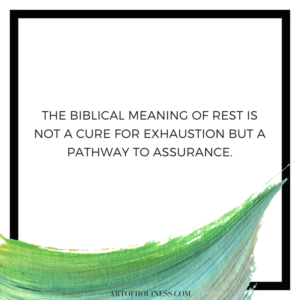 “We who have believed enter that rest.” — Hebrews 4:3
“We who have believed enter that rest.” — Hebrews 4:3
You never know when you might need to defend your position on the theology around the phrase, “once saved, always saved.” It happened to me a week or so ago while I was purchasing a couple of things from a small-town boutique. The woman behind the counter shared that her mother was a preacher, that for years she preached in a holiness church until becoming a Baptist. She changed theological streams because she couldn’t make herself believe in the Wesleyan doctrine of free will to the extent that it allows us to actually lose touch with our salvation.
Since I live in the birthplace of the Southern Baptist Convention, this isn’t the first time I’ve had this conversation. I’ve come to suspect there is a gross misunderstanding of how Wesleyans approach free will and salvation. Often, it is made to sound as if it is God’s choice to drop us whenever he feels like it. “Mess up on Facebook? You’re fired!” “Yell at your dog? You’re not saved any more.”
That take on the gift of free will misses the mark by a wide margin. Free will is not God’s prerogative to exercise; it is ours. We are the ones who place ourselves in jeopardy of moving beyond His presence, though even that isn’t as easy to do as we make it sound.
Think of it like a parent holding a child’s hand as they walk across a busy street. The parent’s whole desire in that moment is to get her child safely across that street. That parent isn’t making decisions while they walk about whether or not she really likes that child, or whether this parenting thing is worth it. No! All that parent is thinking is, “Let me keep my child safe.”
Now, suppose this parent has a particularly strong-willed and active kid who is easily distracted. Is she going to hold on more loosely or more tightly to that little one? More tightly, of course! But suppose that active and strong-willed child sees a quarter laying in the street just up the way, something shiny enough to get his attention and valuable enough to make him want it. The child begs his mother to let him go after that shiny thing, but she says no. She realizes the danger of loitering too long in traffic. She knows the destination is the other side — not shiny, distracting things. Her sole intent is to get them both safely across; she is not about to let him go.
The child, however, is relentless. The more he watches the shiny thing, the more sure he is that it is worth the escape so when he sees a split-second of opportunity, he wrenches his hand out of his mother’s and darts into traffic. Now he is out from under the cover of his parent’s care, not by her choice but his.
Did the mama let him go? Did she want him to do that? Did she cause him to do that? Absolutely not. The intention of the parent at every point was to get her child through the traffic safely. The intention of the child when they stepped off the curb together and headed into traffic was to go where his mother led him. But that desire only took him so far. Having held onto a predisposition toward shiny things for too long into the journey has kept him from being completely surrendered to his parent’s plan.
And that is how Wesleyans view salvation. God gives it, but we have to accept it. By the same token, God walks us through the journey of salvation, inviting us to work it out daily with fear and trembling, but at every point on the way we must make the choice to keep our hand in His. This is the responsibility we bear for the gift of free will.
So what about that “blessed assurance” we always sing about? Is it so blessed after all? Is there really any assurance? Absolutely! Assurance is not the promise that once you say yes to God, you’ve got it easy. That promise is given to no one, believer or not. Assurance is the promise that with your submission and surrender, God will get you safely through the traffic to the other side. Our decision to simply rest our hand in His — to submit to His will. That is all that’s required, and that is only a struggle if we choose it to be.
And that, brothers and sisters, ought to create a deep well of rest within your soul and mine. Because if I believe God is good, God is for me, and God will see me through to the other side, then the rest is details.
Listen: The biblical meaning of rest is not a cure for exhaustion but a pathway to assurance.* When we are in sync with God, assured of his character and presence, willing to let him carry us safely across the chasm, we rest.
Blessed assurance, indeed.
*I recently heard it put this way: The cure for exhaustion is not rest, but wholeheartedness (Brother Rast). I think we’re saying the same thing. When your whole heart is for God, when you are undivided in your devotion, you will be able to rest completely in his care and cover.








